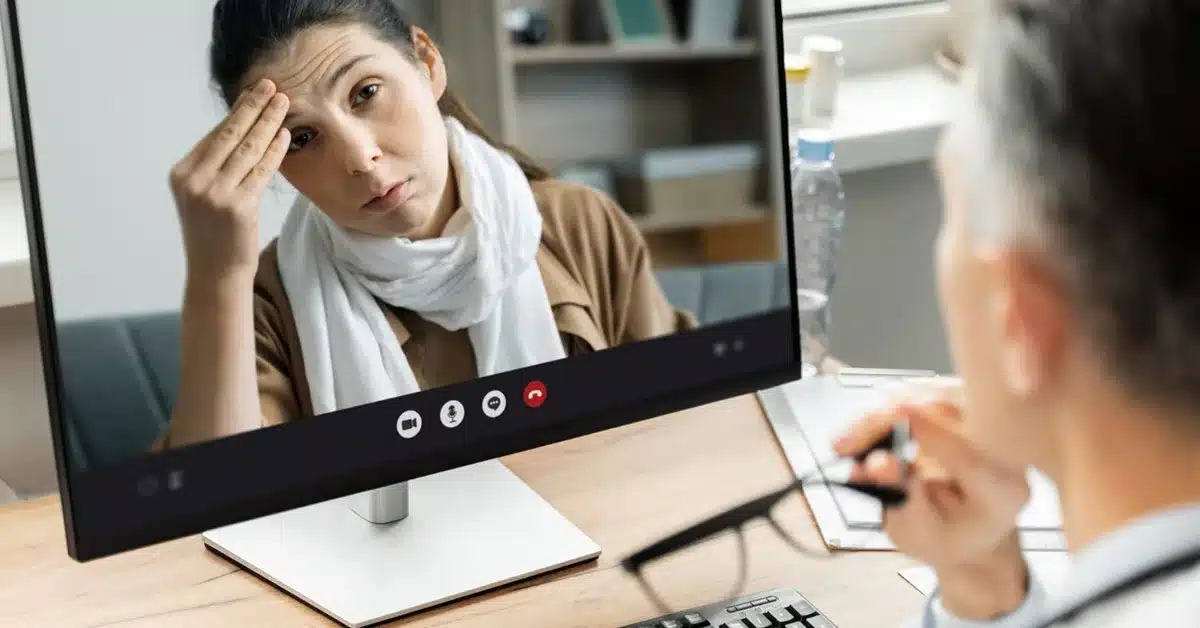Did you know that approximately 280 million people worldwide struggle with depression, according to the World Health Organization? Depression is more than just feeling sad sometimes – it’s a mood disorder that can stem from various causes, such as genetic vulnerabilities, faulty mood regulations by the brain, or stressful life events.
Depression, also known as a Depressive Disorder, is a persistent condition that hampers a person’s ability to enjoy life and often leads to a loss of pleasure in activities. It does not discriminate and can affect individuals regardless of their backgrounds. However, it is worth noting that women are about 50% more likely to experience depression than men.
In this guide, we will explore what depression is and how online consultations can be an effective solution for individuals seeking proper diagnosis, treatment plans, and medications for their mental health conditions.
Online Treatment Options for Depression
The digitalization of healthcare has revolutionized mental health consultation and therapy, making them more accessible and convenient for people. Now, you don’t have to travel long distances or disrupt your existing schedule. This is particularly beneficial for those who find it challenging to get around or prefer the privacy of therapy sessions from the comfort of their own homes.
Online mental health services offer a range of flexible options, including:
· One-on-one therapy sessions
· Group therapy and rehabilitation sessions
· Therapy delivered through text
· Counseling for drugs and substance abuse
· Genuine and easy medical prescriptions
· Medication-assisted treatment for substance use disorders
· Progress monitoring
· Mental health screening
· Referrals
· Anxiety and depression monitoring
Source: TeleHealth.HHS.gov
What’s great about these online options is that they provide the same level of privacy as in-person visits. You can find a quiet and familiar spot at home, connect to the internet, and have a conversation with your therapist without worrying about your privacy being compromised. Moreover, most health insurance plans cover online mental health services just as they would regular doctor visits.
Effective Therapies for Depression
Cognitive Behavioral Therapy (CBT)
One of the key methods used in online depression treatment is Cognitive Behavioral Therapy (CBT). CBT prompts individuals to reflect on their thoughts and behaviors, helping to reduce symptoms of various mental health conditions. The beauty of CBT in an online setting is that it can be done at your own pace and in the comfort of your own space. This makes it ideal for those who value privacy or have a busy schedule.
Combining Therapy and Medication
In some cases, combining therapy with medication is the most effective approach to managing severe depression. Medication can help manage symptoms, while therapy addresses the underlying causes. When these two strategies are employed together, it can lead to a faster recovery. It’s important to remember that each person’s journey with depression is unique, so finding the right treatment and professionals is crucial.
Interpersonal Therapy (IPT)
Interpersonal Therapy (IPT) focuses on current problems, relationships, and communication styles to help individuals. Typically, IPT involves 8 to 16 sessions, depending on the severity of the condition. By examining interpersonal dynamics, this therapy aims to improve overall well-being and promote healthier relationships.
Behavioral Activation Therapy
Behavioral Activation Therapy is a form of therapy that explores how one’s actions impact their mood. This type of therapy is particularly helpful for individuals who withdraw from social activities or experience depressive symptoms. By making changes to a person’s natural behavior and engaging in positive and enjoyable activities, Behavioral Activation Therapy can significantly improve mood. Generally, this therapy consists of 12 to 16 sessions.
Problem-Solving Therapy
Problem-Solving Therapy equips individuals with the necessary tools and mindset to effectively deal with distressing issues in their lives. Through 6 to 12 sessions with a professional therapist, individuals learn to reactivate their problem-solving skills and cope with stressful experiences more effectively.
Psychodynamic Psychotherapy
Psychodynamic Psychotherapy delves into the unconscious dynamics of an individual, seeking a deeper understanding of their emotions and mental processes to find resolutions. This form of therapy aims to provide insights that lead to personal growth and healing. Psychodynamic Psychotherapy typically entails 8 to 16 sessions.
Remember, finding the right therapy approach and working with skilled professionals is essential in navigating your unique journey with depression.
Source:
- Self-help therapies: NHS UK
- Treatment – Depression in Adults: NHS UK
- https://www.ncbi.nlm.nih.gov/books/NBK64952/
Support Beyond Therapy
Different online resources and healthy interpersonal reflection may help you deal with mild mental health hiccups. You can find books written by experts in the field of psychology and beyond to deal with things like anxiety and depression. Look for books recommended by professional bodies like the Royal College of Psychiatrists. You can get many of these books, like those from Reading Well, for free at your library. Plus, sites like Overcoming offer more help–such as apps and other resources to download–for mental health problems.
It also helps when you talk about your problems to someone outside of your problems or open up to someone emotionally. Look for people in your immediate circle and family with whom you might be able to share a comfortable space to open up.
Connecting with old friends or participating in online groups can also make you feel better. Places like Mind’s Side by Side forum let you chat with people and help you grow and overcome your problems with people who are facing the same mental health conditions. It’s good to know that you’re not alone.
Source:
Special Considerations in Depression Treatment
When it comes to treating depression, it’s important to find what works best for you. Specifically tailored treatment plans are much more effective and tend to give better results. For instance, generational gaps should be considered while providing online treatment so that the optimal mode of communication can be established.
A good example of this approach is the PEARLS (Program to Encourage Active, Rewarding Lives) program. PEARLS is specially made to help older people and adults with epilepsy. It involves home visits where people work on solving problems, being active, and doing things they enjoy. This program helps people have a better, happier life.
Studies have shown great results with PEARLS. People taking part saw their depression symptoms reduce by 50%, while 36% of people even saw it completely disappearing. They experienced an improved quality of life in a physical and emotional context while they felt like going to the hospital less often. PEARLS also works well for adults of all ages with epilepsy.
So, when treating depression, it’s really important to match the treatment to the person. Programs like PEARLS show how focusing on specific groups can make a big difference. This approach is a key part of online treatment for depression.
What We Learned Today
Today, we delved into the world of online mental health consultation for depression and discovered the valuable support and flexibility it offers to everyone. Let’s do a quick recap of the key takeaways:
Online Therapy Options: Online therapy provides various options such as one-on-one therapy, group therapy, and text therapy. These options are not only convenient but also offer privacy, and many of them are covered by insurance.
Effective Online Therapies: Cognitive Behavioral Therapy (CBT) has shown to be particularly effective when conducted online. For more severe cases of depression, a combination of therapy and medication often yields the best results. Other therapies like Interpersonal Therapy (IPT) and Behavioral Activation Therapy can also be beneficial.
Support Beyond Therapy: In addition to therapy, there are additional online resources available, such as self-help books and online support groups. These resources can be highly effective in managing mild symptoms and providing extra support on the journey to recovery.
Personalized Treatment: Personalized treatment programs like the PEARLS program have proven to be highly effective for specific groups with unique needs, such as older adults or individuals with epilepsy. Tailoring treatment to these specific requirements ensures better outcomes.
Recognizing Symptoms and Seeking Help: Recognizing the symptoms of depression and actively seeking help is crucial. Whether it’s through online platforms or in-person support, finding the right support system can have a significantly positive impact on the recovery process.
Remember, online mental health consultation offers a range of options to cater to individual needs, making depression treatment more accessible and effective than ever before.
Keep Reading
Want more? Here are some other blog posts you might be interested in.








